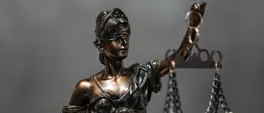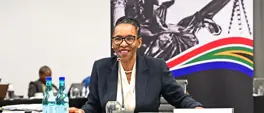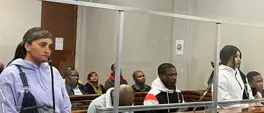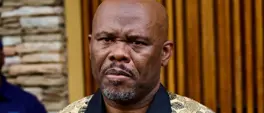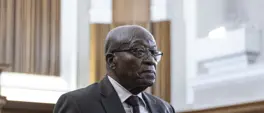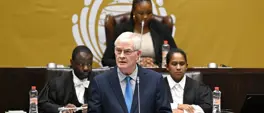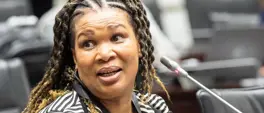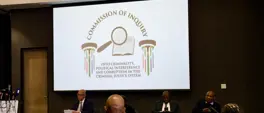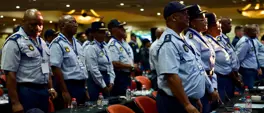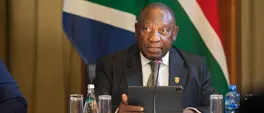JUDITH FEBRUARY | The National Dialogue: Ramaphosa's illusion of action
Judith February
29 August 2025 | 9:56The National Dialogue will collapse under the weight of Eminent Persons, goodie bags, provincial dialogues and a costly secretariat, writes Judith February.
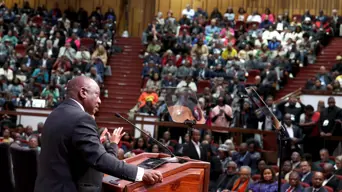
President Cyril Ramaphosa addressed the First National Convention of the National Dialogue, University of South Africa in Pretoria on 15 August 2025. Picture: @PresidencyZA/X
Optics matter. As the National Convention started, footage of the event was circulating on social media.
There was some back and forth and the usual South African habit of standing around, back-slapping, before an event which does not start on time. Spotted too were the ubiquitous "goodie bags" distributed at all these events and so beloved by government organisers. There were high-back chairs on an austere stage, with delegates (if that is what they were) seated cinema-style, watching and waiting.
If there ever was a motif for the separation between government and the people in this Ramaphosa Presidency, then this moment surely captured the disconnect that has marked this Presidency succinctly.
The President opened the National Convention with a laborious speech. One has to ask who writes these dull screeds for Ramaphosa?
He started as follows: "I have called this first National Convention in my capacity as the Head of State.
"I have done so in line with Section 83 of our Constitution, which requires the President, as the Head of State and head f the national executive, to promote the unity of the nation and that which will advance the Republic."
It is interesting that Ramaphosa should mention his Constitutional powers when he seems loathe to exercise them to, for instance, fire the corrupt in his Cabinet.
He went on to say, "We are embarking on a process that will launch a million conversations. … Across the length and breadth of South Africa, people will and must meet to talk of what worries them, what gives them hope and how they think their lives and our country can be better."
South Africans actually talk quite a lot, but perhaps the President is too busy listening to the acolytes within the ANC to listen and hear what people are saying in the media, on radio, through protests and various other means. They also spoke during last year’s national election. They said loudly that they rejected the ANC as a majority party. The President surely understands this? It might be the reason he mostly avoids the press and has been loathe to sit down for one-on-one interviews.
Ramaphosa seems keen to busy himself with the illusion that a National Dialogue represents some form of action.
"Why do South African women have to live in fear of men? Why, after decades of democracy, are the prospects for a white child so much better than those of a black child? Why do clinics run out of medicine? Why do taps run dry?" he asked plaintively.
Ramaphosa surely knows the answer to these questions? The National Planning Commission has an entire site dedicated to this and the other questions.
Aside from the National Planning Commissioners thinking about policy responses to various vexed issues, there is also the Human Sciences Research Council (HSRC), largely state-funded, doing seminal research on the state of our society, including much data to be mined in successive SASAS surveys. Has the President or any of his staff read any of the plethora of research papers at think-tanks and universities across our country?
The "why do taps run dry?" question had unfortunate timing because around the same time, Minister of Water and Sanitation Pemmy Majodina was trending on social media in all her sartorial inelegance. The clip shows her addressing the AU-Africa Water Investment Programme Summit, rambling incoherently and ending her embarrassing speech with the following gem: "We are in control of serious things like water, rivers, dams..."
On the KwaZulu-Natal South Coast, many had not had water for 41 days, cities and towns are falling apart.
Taps run dry, My President, when someone so clownishly out of her depth is assigned a crucial portfolio. Equally so, when those in provinces and municipalities rig tenders and live without fear of consequences.
In much of what was recycled rhetoric, one line in Ramaphosa’s speech stood out. It was revealing in its emptiness. He asked: "Why do so many people live in abject poverty and so few live lives of opulence?"
Ramaphosa might be surprised to learn that successive Afrobarometer data has found that South Africans want jobs, decent healthcare, proper education for their children and to be safe from crime.
The use of the word "opulence" is what Americans would call "a tell".
The ANC is awash with corrupt gains which buy opulence - Louis Vuitton handbags, Mashatile’s R28 million Constantia house, peak opulence some might say, German cars worth millions as money is pilfered from the poor.
The opulence is mostly gained through no honest work, simply creaming the top off government tenders in most cases. Opulence has become the way this society has defined success – not through knowledge but rather conspicuous consumption. The greed is choking us all. The failure to build a knowledge-based society is producing a lost generation of young people who see in those in power only the pursuit of opulence. Can we blame them if they strive for the same by whatever means necessary?
Our country cries out for ethical leaders who put people first. The National Dialogue will collapse under the weight of Eminent Persons, goodie bags, provincial dialogues and a costly secretariat.
We have not taken care. The Ramaphosa presidency (and successive ANC governments) have fallen far short of taking the action needed to fix our infrastructure and the economy, even though many aspects of Operation Vulindlela should be lauded. But Ramaphosa has largely been unwilling or unable to use his power to act decisively to arrest corruption and maladministration, even at moments when he had the greatest support outside of the narrow confines of the ANC.
The answers to the President’s questions are in the public domain.
Our challenges will require tough decisions and a commitment to the things that matter. But if we begin from the premise of seeking opulence, we will not find the answers we are looking for.
Words matter. They carry weight and they shape societies.
Judith February is Freedom Under Law's executive officer.
Get the whole picture 💡
Take a look at the topic timeline for all related articles.

